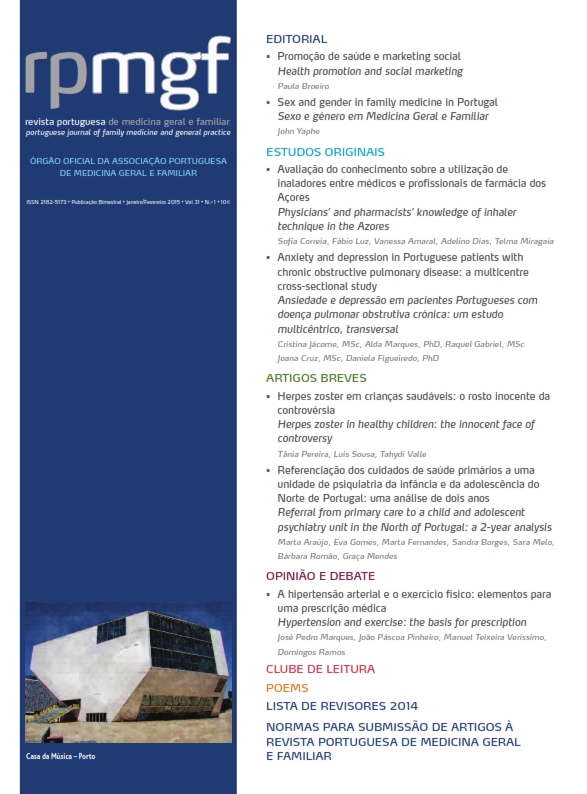Anxiety and depression in Portuguese patients with chronic obstructive pulmonary disease: a multicentre cross-sectional study
DOI:
https://doi.org/10.32385/rpmgf.v31i1.11428Keywords:
Chronic Obstructive Pulmonary Disease, Anxiety, DepressionAbstract
Objectives: To assess symptoms of anxiety and depression among Portuguese patients with chronic obstructive pulmonary disease (COPD) and associated predictive factors. Study design: A multicentre, cross-sectional study. Setting: Three primary care centres and one district hospital in the central region of Portugal. Participants: 302 Portuguese outpatients with COPD. Methods: Symptoms of anxiety and depression were assessed with the Hospital Anxiety and Depression Scale (HADS). Scores ≥8 were considered clinically significant. Results: This sample of patients had a mean age of 67±12 years and 41% were female. COPD was graded as mild in 106 (35.1%), moderate in 106 (35.1%) and severe-to-very-severe 90 patients (29.8%). Clinically significant anxiety was found in 53.3% of patients and symptoms of depression in 45.4%. Symptoms of anxiety were associated with limitation of activities (OR 1.39, 95% CI 1.04-1.84), age (0.97, 95% CI 0.94-0.99) and female gender (OR 0.37; 95% CI 0.20-0.66). Symptoms of depression were associated with functional mobility (OR 1.91, 95% CI 1.38-2.66) and limitation of activities (OR 1.12, 95% CI 1.04-1.21). Conclusions: A high proportion of Portuguese patients with COPD experience symptoms of anxiety and depression. National pulmonary rehabilitation programmes might need to include collaborative self-management interventions to address patients’ emotional needs.Downloads
Downloads
Published
Issue
Section
License
The authors will assign to the RPMGF the sole right to publish and distribute the content of the manuscript specified in this declaration via physical, electronic, broadcasting or any other medium that may come into existence. They also grant the RPMGF the right to use and exploit this manuscript, in particular by assigning, selling or licensing its content. This permission is permanent and takes effect from the moment the manuscript is submitted, has the maximum duration allowed by applicable Portuguese or international law and is of worldwide scope. The authors further declare that this assignment is made free of charge. If the RPMGF informs the authors that it is not going to publish their manuscript, the exclusive assignment of rights ceases forthwith.
The authors authorise the RPMGF (or any entity it may appoint) to act on their behalf when it believes that copyright may have been infringed.





